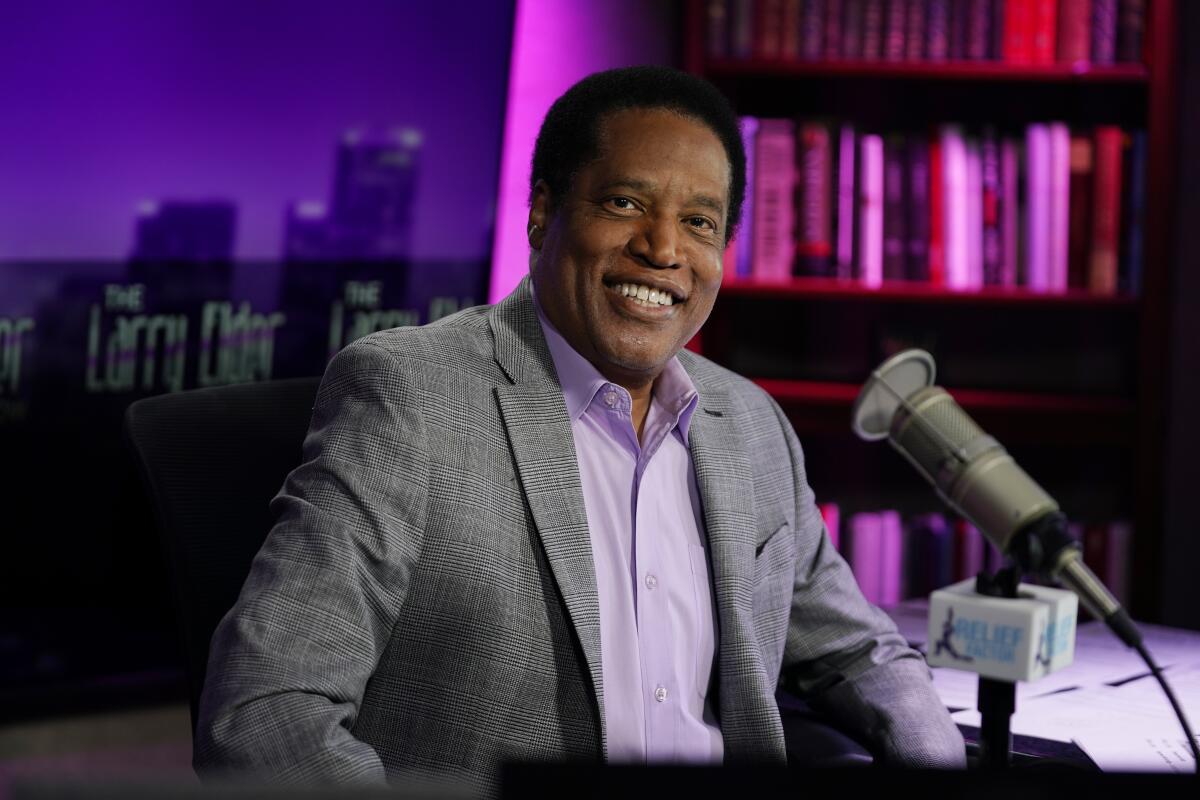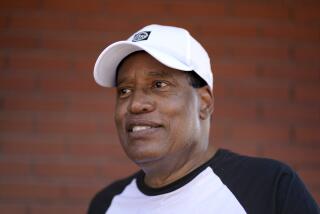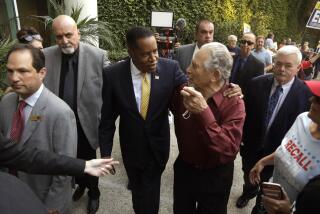Column: How recall candidate Larry Elder mentored Trumpism’s top acolytes

- Share via
Larry Elder, the nationally syndicated conservative talk show host who is running to replace Gov. Gavin Newsom, played a little-known role in the rise of some of the Trump era’s most toxic figures and ideas.
Elder is a fast-talking, charismatic Black attorney with nearly 2 million followers between Twitter and Instagram. Since the 1990s, when he faced a Black-led boycott because of his racial views, the Los Angeles native has broadcast as the self-styled “Sage from South Central.” He says Black people are “more racist” than whites.
White grievance politics were once the purview of neo-Nazis and the Ku Klux Klan, as when David Duke claimed “the white man” was the real “second class citizen in America today.” Now, thanks in no small part to Elder and his protégés, the delusion of rampant reverse racism is mainstream in Republican politics and Fox News.
Elder is running in the Sept. 14 recall election as conservatives across the country launch breathless attacks against the boogeyman of “critical race theory.” That’s no coincidence.
Elder’s campaign builds on the fantasy that it’s not racist to deny the threat of white supremacy. “Do I look like a white nationalist to you?” he asked on his show Monday after announcing his entry in the race.
I met Elder at his studio in 2019, while reporting my biography of Trump’s senior advisor Stephen Miller. Elder told me he believes his Blackness gives some listeners “confidence” to hold and share similar views. He has repeatedly twisted crime statistics to portray Black people as more violent than whites — a theme for white supremacists. He blames Black communities’ struggles on an alleged lack of self-determination. (A David Duke talking point).
Elder recalled his mentorship of Miller, the architect of Trump’s cruelest immigration policies. As a Santa Monica teenager, Miller called Elder’s show to complain of left-wing “indoctrination” in his public high school. “I thought he was amazingly articulate,” Elder told me. He invited Miller on as a guest “almost whenever he wanted,” amounting to dozens of times.
While Miller worked for the Trump campaign, Elder told him to make sure that Trump claimed illegal immigration harmed “unskilled, inner city mostly Black and brown workers.” He told him to read up on Hillary Clinton’s “treatment of her husband’s accusers” months before Trump held a press conference featuring Bill Clinton’s sexual assault accusers to distract from Trump’s “grab ‘em by the pussy” scandal.
“I hope to live to see the day when you become president,” Elder emailed Miller in 2016. “Your kind words are heartening beyond measure,” Miller responded, calling him “the one true guide I’ve always had.”
Elder also mentored Breitbart’s editor-in-chief Alex Marlow, who kept a copy of Elder’s book “The Ten Things You Can’t Say in America” in his backpack as a high school student at Harvard-Westlake. “It was loaded with facts I could use when I found myself debating people,” Marlow told me recently.
Marlow heard Miller on Elder’s show “more frequently than any other guest.” Inspired, he reached out to Elder and got an internship with him, helping him land the Breitbart job. Marlow rejects the idea that he, Breitbart or Elder are racist. Last year, Elder produced a documentary on Black conservatives, “Uncle Tom,” co-opting the insult.
Marlow calls Elder “one of the most important American conservatives.” Elder also inspired media provocateur Candace Owens, who calls him one of her “idols.” He’s also had allies in former Atty. Gen. Jeff Sessions and David Horowitz, another Miller mentor, whom the Southern Poverty Law Center categorized as an anti-Muslim and anti-immigrant extremist.
Syndicated columnist Ruben Navarrette, who knew Elder in the ‘90s, told me Elder’s decision to run against Newsom is bad news for the other candidates, like Kevin Faulconer and John Cox. “He’ll demolish any Republican they put up against him in a debate,” Navarrette said, noting Elder’s appearances on Fox News and the fact that he’s “made a living communicating every day of his life since he left law school.”
On social issues, Elder considers himself a libertarian. He opposed California’s infamous Proposition 187, which took aim at state services for undocumented people and children. “The fact that taxpayers underwrite education and healthcare for illegals is an indictment against America’s welfare state, not against hardworking illegals,” Elder wrote in 2000. But he has since embraced harsh anti-immigrant policies, even defending Miller’s migrant family separation policy to me.
In 2012, Elder wrote a memoir, “Dear Father, Dear Son.” Read today, it’s surprisingly moving, recalling whippings and verbal abuse from his father, and their eventual reconciliation. His father was Republican; his mother was Democrat. His father dropped out in eighth grade; his mother had a year of college. “Mom was a better and more informed debater,” Elder wrote.
His parents disagreed about affirmative action. “You can’t hold people back, and then say, ‘I’m sorry, everything’s okay,’” his mother argued. His father countered, “Give people somethin’ for nothin’, you end up with nothin’ for somethin’.”
Although Elder once feared his father, he later identified with him. He was thankful for his steady, if sometimes “cruel” presence; Elder blames crime on absent fathers. He credits his father for teaching him the value of hard work.
Elder, while perhaps more palatable than some of his protégés, has the power to do as much harm precisely because of his ability to seem relatable, even reasonable. His talent for cathartic storytelling obscures the role of history and legal and economic structures on individual lives. His banner of “self-determination” doesn’t seem to apply to people struggling to prevent this country from repeating the crimes of the past.
Elder likes to rail against “victicrats” — his label for people who believe they’re oppressed. He rarely talks about the institutional forces that victimize real people. Instead, he’s found a niche enabling white victimhood.
More to Read
A cure for the common opinion
Get thought-provoking perspectives with our weekly newsletter.
You may occasionally receive promotional content from the Los Angeles Times.










